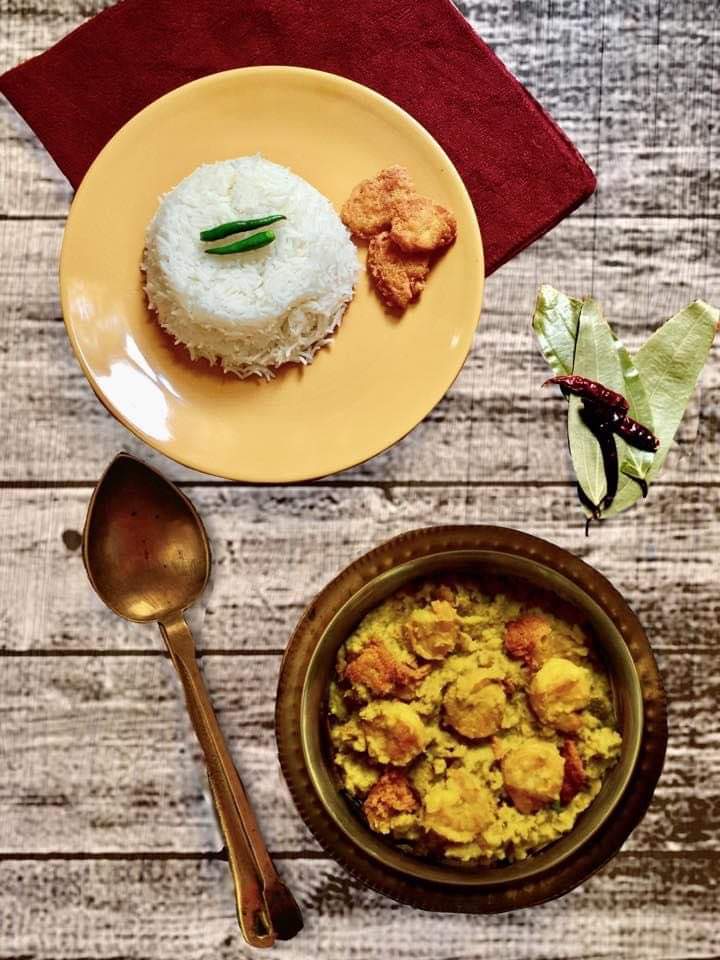Translated from the Bengali by Upama Mukherjee
Purpuri made with Kochu root: a mixed dish made with stalks of Kabil Kochu and Prawn fritters
Thakuma’s worship utensils were all made of brass. Post-puja, the daughters-in-law of the house scrubbed them with tamarind and soil at the side of the courtyard.
The house never seemed big enough. Father, uncles, aunts… about seventeen to eighteen people seemed to keep it brimming at all corners. I was the only child among the crowd of elderly people. And, that too, a highly imitative one.
Maa says that there was a time when I could pick up someone’s behavior or any physical posture almost instantly. Even the ways of calling out to someone could not be left out of this game of imitation.
Thakuma addressed the daughters-in-law as bouma. Why should I not? So, except my mother, all my aunts became my bouma. They still are.
After they were cleaned, the brass utensils were left to dry on the red-floored balcony adjacent to Thakuma‘s room. As soon as I began tracing an alpona with my finger in the water drained from the utensils, there was a cry at the door that the essentials from the market had arrived. And before the last petal was finished on my water curlicue on the red floor, bags returned fully from the bazaar slumped on the yard with a soft thump. One had greens and the other had fish.
The vegetables would be sent immediately to the kitchen balcony for cutting and cleaning. And the fish would be poured into a big aluminum container in the yard.
A number of shrimps would sometimes cling to the glistening bodies of Naolafish. Thakuma used to call these Icha fish.
And Icha meant that a purpuri with Kochu was due.
In those days, shrimps were not available in the same size. The small and the large ones were mixed. Thakuma asked the tiny Ichas to be kept aside.
Purpuri got started after everything else was cooked.
Boiled maan kochu was to be served first, followed by fried red amaranthus and gourd curried with fish-head, then when the Naola fish broth was put together with potato, eggplant, and green chili let out the final brimming bubbles, the stalks of kabil kochu from grandma’s kitchen garden would have come to the kitchen.
As soon as Maa began peeling the stalks, Mejo bouma would sit down to paste two kinds of pre-soaked lentils—mung and matar.
By the time the stalks were put to boil, grandpa would be done with his ahnik. No matter how many times he called for me, I would not budge from the kitchen for I wanted those dal fritters on my plate of rice.
Those days, grandpa had to eat without me. Once the kochu stalks were cooked, Maa mashed the small Icha fish on that pestle.
Thakuma put the oil in the pan and went to the balcony of her room with a few handfuls of rice in a brass pot. “It’s not good,” she used to say, “to serve rice once on the plate.” She rushed to the kitchen after she ladled a tiny portion of rice on grandpa’s plate. Meanwhile, Maa had placed the brass bowl containing pasted lentils, and Icha fish mixed with turmeric and salt next to the kilt.
Thakuma takes the batter in her hand, flattens small dollops with her fingers, and drops them carefully from the sides of the pan into the hot oil. From the sizzling sound and the smell of the steam, I realize I probably should not have ignored grandpa’s call after all.
Thakuma would observe my face and hold out a hot deep-fried fritter to me and say, “Hungry, Didi?”
A few pieces of Icha fish were also fried in that oil after fritters. Then cumin seeds, bay leaves, and condiments were added to it. As soon as the seasonings began to let off a peppery smell, the boiled stalks of the edible root or kochu would be added followed by the boiled stalks mixed with turmeric and salt, and a number of green chilies.
By that time, almost everyone in the house had their lunch except Thakuma and her daughters-in-law. And yes, I was also there, sitting in the corner of the kitchen, waiting for the cooking to finish.
She hastily lifts the lid, stirs the softened stalks into a mush and adds the lentils and Icha fritters, and puts the lid back on just for the final few minutes.
While the purpuri got done, sitting blocks were lined up outside on the kitchen balcony.
Thamma begins to serve rice on brass plates for the women. She knows from the steam escaping the slight gap in the lid when the purpuri was purposely overcooked. She pulled out some charcoal from inside the oven to reduce the heat and sprinkled a little sugar, cracked the fritters into the stalks.
A small amount of purpuri was put on my plate from an iron grater, and serving it with the fritters kept aside, granny would say, “Finish this first, and I will give you more.”
I used to keep the rice and purpuri aside, munching on the fritters first, and watched granny gulping water from the brass pot right after having the rice with purpuri.
And I would spell out the letters engraved on it —”A-ru-na-ba-la.”
The above is an excerpt from Smriti Bhadra’s book Roshui Ghorer Royak (Days In The Kitchen), first published in 2021. The book is a collection of eclectic recipes from the author’s bygone days. Not merely a book of recipes with meticulous instructions and information, it presents itself as a food memoir wherein the author reminisces about her life through myriad food items that are intrinsically entwined with her cultural identity. This is the fifth part of the series of the translated book. To read the first, second, third, and fourth parts, click on the following links:
To read the following sixth part, click on the following link:
Also, read a Bengali fiction by Wasi Ahmed, translated into English by Anujata Bhattacharya, and published in The Antonym:
Follow The Antonym’s Facebook page and Instagram account for more content and exciting updates.




























0 Comments